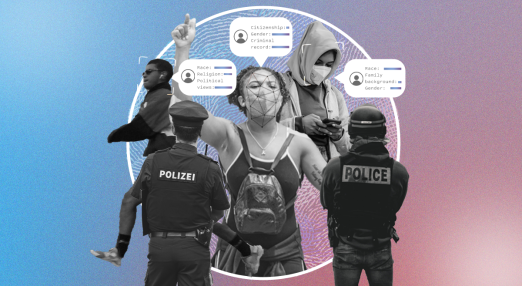Europol
Filter by...
-

Europol is going to collect a massive collection of intimate conversations from European youngsters
This story begins with the creation of a new European agency, but ends with one of the world's largest databases of private chats and images shared by European youngsters—built by the police.
Read more
-

Rather delete than comply: how Europol snubbed data subject rights
On 8 September 2022, the European Data Protection Supervisor (EDPS) issued a decision ordering the EU law enforcement agency, Europol, to give Dutch activist Frank van der Linde access to the personal data the agency holds on him following a two-year investigation by the data protection watchdog. Findings of the inspection reveal that Europol tried to cover up the traces of the data processing and to avoid complying with the data access request by deleting van der Linde’s data.
Read more
-

Europol’s ever-increasing mandate: European Parliament failed to stand up for fundamental rights
Today, 4 May, Members of the European Parliament (MEPs) approved the revision of Europol’s mandate and the Schengen Information System. This supports a massive, unchecked expansion of Europol’s powers, posing a threat to people’s rights through over-policing, mass surveillance and discrimination.
Read more
-

Europol’s new powers will enable Big Data analysis and mass surveillance. We say NO!
The European Parliament is soon to vote on the new Europol reform which aims to expand the law enforcement agency’s powers without any accountability and with as few fundamental rights safeguards as possible. To influence the vote, EDRi has mobilised civil society organisations in a joint advocacy action of reaching out directly to members of the European Parliament to urge them to vote against the proposal.
Read more
-

Europol’s reform: A future data black hole in European policing
The European Parliament is soon due to vote on the powers expansion of the European Union’s law enforcement agency, Europol. Civil society has been extremely critical of Europol’s mandate revision, raising many concerns with regards to the lack of fundamental rights protections and policymakers’ blind and absolute trust in how the agency will use its new powers. All the more reasons to be worried: the result of the trilogue negotiations with the Council of the EU made it even worse.
Read more
-

Secret negotiations about Europol: the big rule of law scandal
In negotiations held behind closed doors, the Council of Member States and the European Parliament are about to torpedo all the efforts of the European data protection watchdog’s to hold Europol accountable for its illegal data practices.
Read more
-

The EU’s own ‘Snowden Scandal’: Europol’s Data Mining
On 3 January 2022, the European Data Protection Supervisor (EDPS), which supervises the processing of personal data by the EU’s law enforcement agency, Europol, ordered Europol to delete data held in its databases on individuals with no established link to criminal activity.
Read more
-

UN Special Rapporteurs challenge EU’s counter-terrorism plans
Through their communication, the Special Rapporteurs demonstrate how several existing and foreseen EU security measures fail to meet the principles of legality, necessity and proportionality, enshrined in European and international laws (such as the Regulation on preventing the dissemination of Terrorism Content Online and the processing by Europol of sensitive data for profiling purposes). The fatal flaw lies in the use of broad and undefined terms to justify extensive interferences in human rights.
Read more
-

EU ropes in intelligence agencies for enhanced border checks targeting Afghan nationals
Intensified border security checks targeting Afghan nationals have been agreed by the Council of the EU, with the procedures requiring the extraction of mobile phone data and significant coordination with national intelligence agencies – despite the EU having no competences in the realm of “national security”.
Read more
-

MEPs poised to vote blank cheque for Europol using AI tools
This week, MEPs recognised the dangers of certain uses of Artificial Intelligence (AI) in criminal justice. A strong majority rallied around the landmark AI in criminal matters report by the European Parliament's Civil Liberties, Justice and Home Affairs (LIBE) committee, which opposes AI that 'predicts' criminal behaviour and calls for a ban on biometric surveillance.
Read more
-

How Europol’s reform enables ‘NSA-style’ surveillance operations
“More than 100 million”. That’s the number of encrypted messages that French and Dutch law enforcement announced they had collected after infiltrating Encrochat in 2020, a company selling encrypted communication services and devices, writes EDRi's Chloé Berthélémy.
Read more
-

Europol inches closer to increasing its powers despite lacking accountability
Europol was caught breaking the law and developing new initiatives without any proper legal basis (e.g. Europol’s innovation lab). Many proposed changes to Europol's mandate show an attempt to legalise the agency’s unlawful activities. In addition, this revision is happening even before the first implementation evaluation of Europol’s Regulation, planned for 2022, has been carried out. Without this evaluation, it is impossible to assess whether the current rules impede the fulfilment of the Agency’s missions and whether its working practices respect fundamental rights.
Read more
